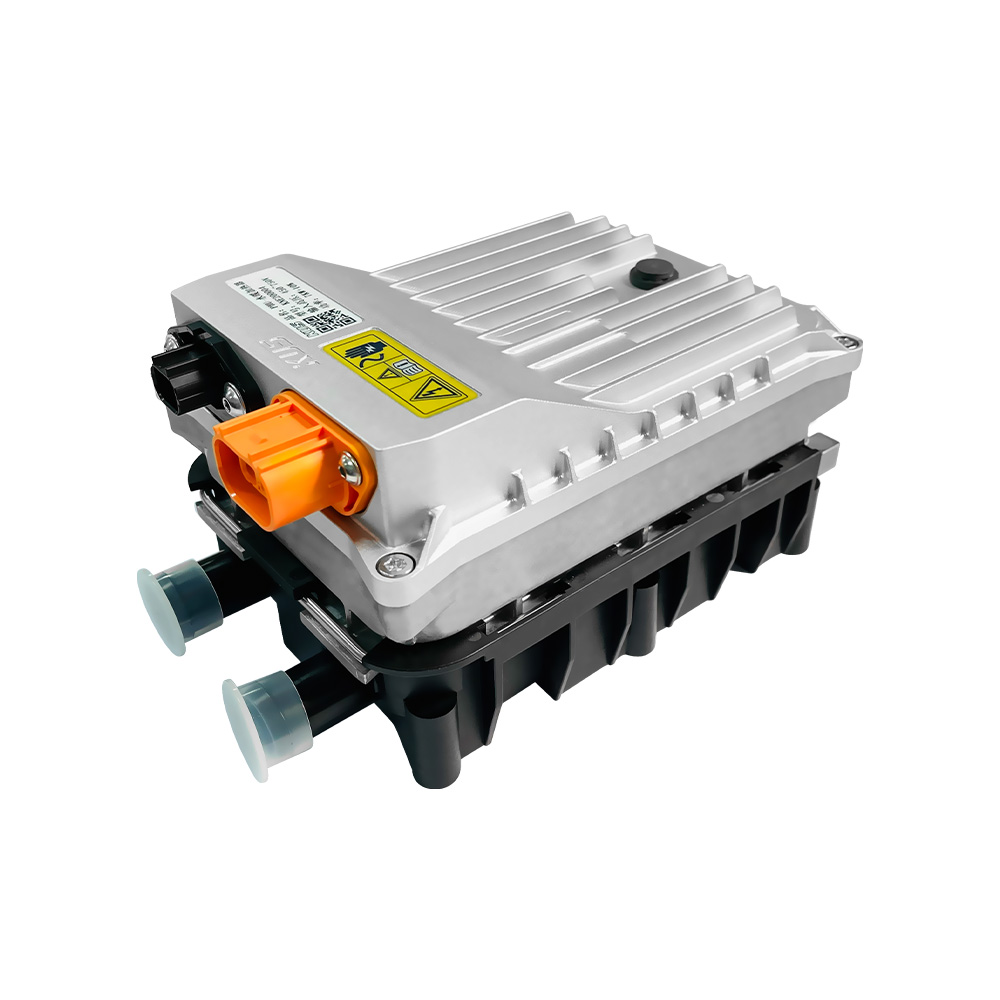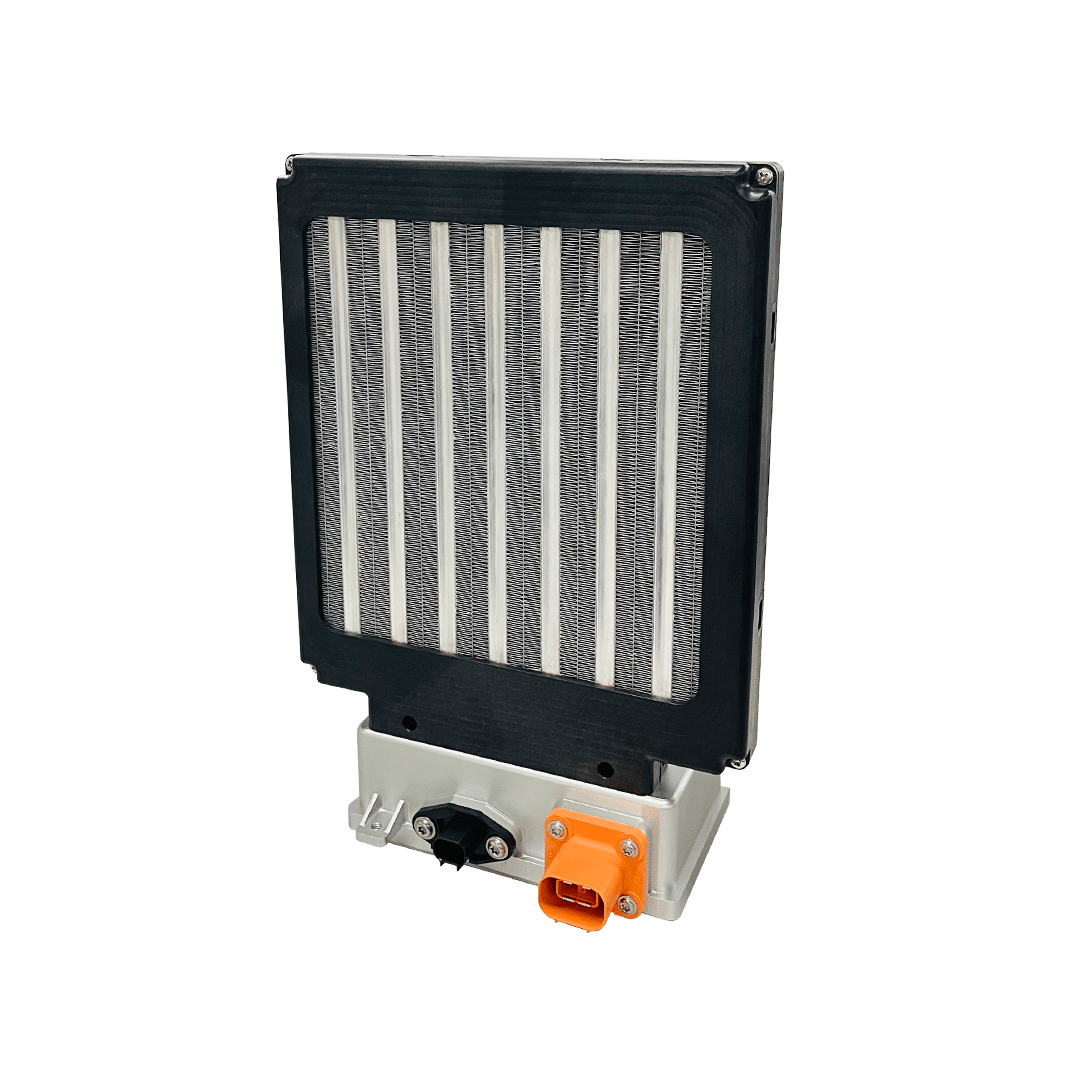The market for electric vehicles in the U.S. is rising, with record sales reported in the second quarter of 2023. This has resulted in a need for more efficient vehicle components, such as the ones used in modern heating and cooling systems. That is why KUS now offers components for energy-efficient vehicles, including our positive temperature coefficient (PTC) heating units. Here’s what you need to know about PTC heaters and their role in thermal management systems.
What Is a PTC Heater?
PTC heaters operate on the principle that the electrical resistance of the heater increases as the heater’s temperature increases. The result is a self-regulating heating system. Unlike traditional heating elements that might require external thermostats or regulators, PTC heaters automatically adjust their heat output based on ambient temperature, this increases performance and reduces risks of potential thermal events.
One of the standout benefits of using PTC heaters over traditional heating elements is their efficiency. These systems can generate more heat while using less energy. By conserving energy, these heaters offer tangible benefits for electric vehicles, such as increased cruising ranges.
Comparing PTC Coolant Heaters and PTC Air Heaters
While PTC heaters have gained popularity in the automotive industry, it’s important to understand that different types are designed for specific applications. Two of the most commonly used types are PTC coolant heaters and PTC air heaters.
 PTC Coolant Heaters
PTC Coolant Heaters
PTC coolant heaters are designed to heat a vehicle’s coolant. It primarily serves as a channel with a heating element to help maintain the vehicle’s battery at an optimal temperature. For this reason, they serve as an essential component for electric applications, especially during colder months. Maintaining the correct temperature for the battery ensures longevity and maximizes the vehicle’s performance.
 PTC Air Heaters
PTC Air Heaters
As the name suggests, PTC air heaters focus on heating air directly. They are often used with a vehicle’s HVAC system to ensure the interior remains comfortable for passengers. In many modern vehicles, PTC air heaters have replaced the traditional heater core used in older models. PTC air heaters provide immediate warmth since they don’t rely on a secondary medium like coolant. This direct method can offer more rapid temperature changes in the cabin, enhancing passenger comfort, and help to decrease additional leak path potentials.
The Role of PTC Heaters in Alternative Energy Vehicles
KUS heaters feature impressive designs that help them serve in various applications. Our heaters stand out for several reasons, including:
- In-vehicle air conditioning. Air conditioning systems are necessary in modern vehicles, and PTC heaters ensure that the in-vehicle A/C systems are up to the mark.
- Battery thermal management. Batteries, especially those in electric vehicles, need to operate within a specific temperature range to ensure longevity and efficiency. PTC heaters help maintain this optimal temperature, especially during colder months.
- Hydrogen fuel cell cold starts. Starting a new energy vehicle in cold conditions can be challenging, especially if it’s a fuel-cell vehicle. PTC heaters assist in these cold starts, ensuring the vehicle operates smoothly regardless of the external temperature.
PTC Heater Benefits and FAQs
KUS PTC heaters offer several advantages over traditional heating elements. However, many are unfamiliar with these benefits. Here are some of the most common questions we receive about our PTC heater products.
What is the benefit of the PTC heating element?
The main benefits are energy efficiency, precise temperature control, and compact size. PTC heaters self-regulate their heat output based on conditions, maximizing efficiency.
How efficient is a PTC heater?
PTC heaters are very efficient. They generate more heat using less energy compared to traditional heating elements, thanks to their automated, self-regulating design.
What is the maximum temperature for a PTC heater?
PTC heaters can typically heat up to around 572°F (300°C) efficiently. The maximum temperature depends on the specific heater’s design and specifications.
Are PTC heaters cheaper to run?
Yes, PTC heaters are generally cheaper to operate. Their energy efficient design means they use less electricity to produce heat. This saves on energy costs compared to less efficient heating methods.
What size are KUS PTC heaters?
With the push toward more compact vehicles, every inch of space counts. KUS PTC heaters feature compact designs without compromising efficiency. At the same time, we offer multiple PTC heater products that meet the needs of a wide variety of applications.
PTC Heater Models and Specifications
From Electric Automotive vehicles to Material Handling and Industrial/Commercial platforms, KUS PTC heaters can be used in a wide range of applications. Review our popular PTC heater models in the chart below.
KUS PTC Water (Coolant) Heater Models
| Model | Rated Voltage | Rated Power | Rated Condition | Dimension (L*W*H) | Customized Pressure Drop |
| NPH10A | 80V | 3kW | Flow rate: 10L/min Coolant temp: 32°F/0℃ |
182*136*112 | 10kPa |
| NPL20 | 350V | 5kW | Flow rate: 10L/min Coolant temp: 140°F/60℃ |
182*136*110 | 5.5kPA |
| NPH30A | 600V | 7kW | Flow rate: 10L/min Coolant temp: 32°F/0℃ |
221*136*110 | 20kPa |
| NPH30C | 600V | 7kW | Flow rate: 25L/min Coolant temp: 32°F/0℃ |
321*170*128 | 14.7kPa |
| NPH40 | 600V | 10kW | Flow rate: 10L/min Coolant temp: 32°F/0℃ |
255*299*104 | 3kPa |
| NPH50 | 600V | 15kW | Flow rate: 25L/min Coolant temp: 32°F/0℃ |
255*229*104 | 8.6kPa |
| NPK40 | 800V | 10kW | Flow rate: 12L/min Coolant temp: 140°F/60℃ |
255*247*104 | 3kPA |
| NWL40 | 350V | 4kW | Flow rate: 12L/min Coolant temp: 68°F/20℃ |
153*191*88 | 3kPa |
| NWH80 | 800V | 8kW | Flow rate: 12L/min Coolant temp: 68°F/20℃ |
200*237*88 | 5kPa |
KUS PTC Air Heater Models
| Model | Rated Voltage | Rated Power | Rated Condition | Dimension (L*W*H mm) | Weight |
| Air Heater (Integrated Type) | 800V | 10kW | Inlet air temp: 77°F/25℃
Air speed: 7m/s |
370*260*108 | 6.5kg |
| Air Heater (Split Type) | 600V | 5kW | Inlet air temp: 77°F/25℃
Air speed: 4.5m/s |
250*280*32 | 3.0kg |
| Air Heater (Integrated Type) | 600V | 5kW | Inlet air temp: 77°F/25℃
Air speed: 4.5m/s |
317*180*108 | 3.7kg |
| Air Heater (Split Type) | 350V | 5kW | Inlet air temp: 77°F/25℃
Air speed: 4.5m/s |
250*280*32 | 2.8kg |
| Air Heater (Integrated Type) | 48V | 4kW | Inlet air temp: 77°F/25℃
Air speed: 4.5m/s |
227*167*98 | 3.1kg |
| Air Heater (Integrated Type) | 350V | 3kW | Inlet air temp: 77°F/25℃
Air speed: 4.5m/s |
305*180*108 | 3.1kg |
| Heat Pump Air Conditioning Auxiliary Heater | 12V | 1kW | Inlet air temp: 77°F/25℃
Air speed: 4.5m/s |
27*93*30 | 0.7kg |
For more information, visit our PTC heaters product page.
Explore More New Energy Products From KUS
PTC heaters will play an increasingly important role in vehicles moving forward. With their efficiency, safety features, and adaptability, they are set to redefine vehicle heating systems.
At KUS, we’re ready to meet the changing demands of the automotive industry. With our range of PTC heaters and other new energy products built and tested in-house, we’re your trusted partner for a large selection of marine, vehicle, and industrial applications. Contact us today to speak with an expert on our team to learn more about how our products can meet your project needs.
